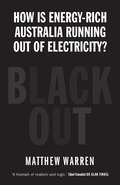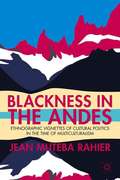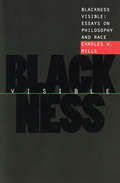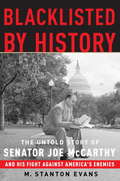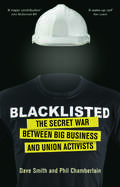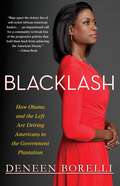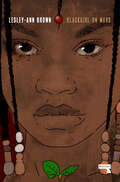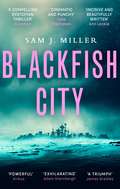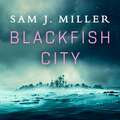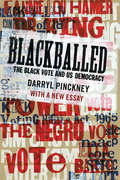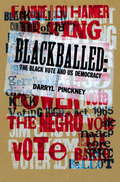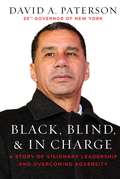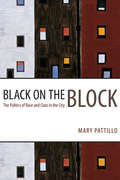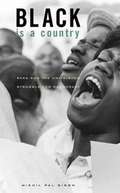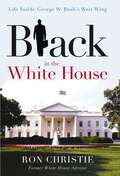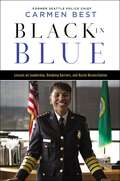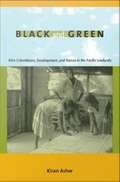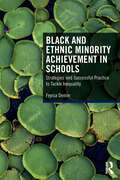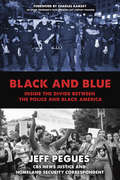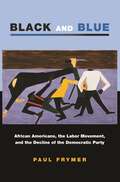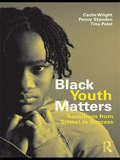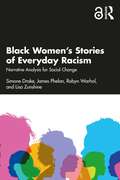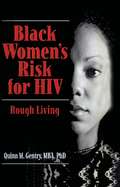- Table View
- List View
Blackout
by Matthew WarrenFor 20 years Australia has been in political denial about the seismic changes occurring in the way we power our country. Successive governments continue to tell people that power prices will fall while the lights stay on. Debate is reduced to two equally preposterous narratives: coal-fired, climate change indifference versus an impossibly utopian renewable energy future. This nonsense swirls around an incredulous public while power prices rise, the grid is stretched, energy becomes political poison and the earth warms. How did it come to this and how can we find our way out of this mess?Matthew Warren has worked for all sides of the energy industry, is regularly attacked for being too pro-coal and too pro-renewables, and writes without fear or favour. He has been lobbying for a national climate and electricity policy for over a decade. With an entertaining and fascinating narrative, Blackout cuts through the waffle to chart the disintegration of Australia&’s energy security, call out what is holding us back, and plot the way for a brighter future.
Blackness in the Andes: Ethnographic Vignettes Of Cultural Politics In The Time Of Multiculturalism
by Jean RahierThis book examines, in Andean national contexts, the impacts of the 'Latin American multicultural turn' of the past two decades on Afro Andean cultural politics, emphasizing both transformations and continuities.
Blackness Visible: Essays on Philosophy and Race
by Charles W. MillsCharles Mills makes visible in the world of mainstream philosophy some of the crucial issues of the black experience. Ralph Ellison's metaphor of black invisibility has special relevance to philosophy, whose demographic and conceptual "whiteness" has long been a source of wonder and complaint to racial minorities. Mills points out the absence of any philosophical narrative theorizing and detailing race's centrality to the recent history of the West, such as feminists have articulated for gender domination. European expansionism in its various forms, Mills contends, generates a social ontology of race that warrants philosophical attention.Through expropriation, settlement, slavery, and colonialism, race comes into existence as simultaneously real and unreal: ontological without being biological, metaphysical without being physical, existential without being essential, shaping one's being without being in one's shape. His essays explore the contrasting sums of a white and black modernity, examine standpoint epistemology and the metaphysics of racial identity, look at black-Jewish relations and racial conspiracy theories, map the workings of a white-supremacist polity and the contours of a racist moral consciousness, and analyze the presuppositions of Frederick Douglass's famous July 4 prognosis for black political inclusion. Collectively they demonstrate what exciting new philosophical terrain can be opened up once the color line in western philosophy is made visible and addressed.
Blacklisted by History: The Untold Story of Senator Joe McCarthy and His Fight Against America's Enemies
by M. Stanton EvansJournalist and commentator Evans assures his readers that McCarthy had access to information about communist infiltration of the US government and that his charges were based on fact. Evans's interpretation of archival material he understands to have been long forgotten or hidden indicates McCarthy was justified in conducting hearings and censuring individuals. Further, Evans believes the Truman and Eisenhower administrations and State Department officials lied about spies in their midst and ignored warnings by the FBI that individuals in key positions were secret communists. As he goes case by case, finding anomalies in records, Evans also claims that McCarthy was convinced by evidence that those he targeted were not victims but enemies, and that he was destroyed by a conspiracy that appears to extend to this day in history books. Annotation ©2008 Book News, Inc., Portland, OR (booknews.com)
Blacklisted
by Dave Smith Phil ChamberlainBlacklisted tells the explosive story of the illegal strategies used by transnational construction companies to deny union activists work.This is the story of a bitter struggle, in which employers' collusion with the police and security services resulted in victimization, violence and unemployment, with terrible effects on families and communities.Investigative journalist Phil Chamberlain and Dave Smith, campaigner and victim of blacklisting, lift the lid on the shameful and immoral practices that went on behind the scaffolding. Hundreds of testimonies (blacklisted workers, Special Branch spies, company representatives, union members and more) and extracts from blacklist files expose the scale of the scandal and the human stories behind the secret war. In forensic detail the authors make a powerful and unequivocal case for human rights and for justice to finally be done.
Blacklash
by Deneen BorelliThis country is at a crossroads. We can either reverse direction or nosedive into a cycle of dependency that is turning America into a welfare nation--a "government plantation" where the underclass are doomed to 21st-century servitude. Now, Deneen Borelli, one of the most visible and outspoken black conservatives in the country, is fighting back--taking action, not just talking--and speaking up for those who can't or are too afraid to do so. Borelli's argument is a solid one: the problem begins with President Barack Obama, whose policy overreach has frozen racial tensions in this country when he should have been thawing them. The Left, having introduced the race card to defend Obama from the massive unpopularity of his policies, has turned a blind eye to the leadership failures that have spread down through black career politicians--traitors to minority success--who are causing a cycle of oppression in America: specifically Charles Rangel, Al Sharpton, and Jesse Jackson, each of whom has enriched himself at the expense of his community. Borelli also challenges the ninety-five percent of the black Americans who voted for Obama without caring about or vetting his dangerous politics. Borelli doesn't stop there. She speaks out against the elites and crony capitalists who drive expensive government policies such as needless green initiatives and ObamaCare. She exposes government regulation and the NAACP as nothing more than a liberal front group. She points out each grave flaw in the current administration, big government, unions, and special-interest groups. She demands that new black leaders abandon the false rhetoric and inexcusable lies of so-called progressive politics. She asks the questions that people of all colors are afraid to ask, and delivers the honest, unyielding, and controversial answers that have made her the favorite of the left-wing firing squad. Today, with taking a stand against Obama, comes the fear of being called a racist. There is no fear in Deneen Borelli. Her outspoken voice gives everyone the courage and ammunition needed to stand up against destructive progressive tyrants. She is a brave critic, bold and proactive--not reactive. Hers is a story a lot of people don't want to hear--no matter how firmly they believe it to be true. Deneen Borelli is here to ignite a fire in independent-minded Americans. Blacklash is the fuse. *** "I'm conservative. I believe in the power of the individual. I'm a freethinker, and I love my country. Yes, I'm also black, but that fact has nothing to do with my belief in limited government. I don't like President Barack Obama's progressive policies and his administration's spending habits. But some people apparently think that my economic concerns shouldn't supersede my racial allegiance. "Nobody wants to be told they're racist simply because they are too conservative to buy into Obama's policies. People are too nervous to speak out, so I'm speaking out for them. We need change. We really do. We just can't afford the kind that Obama and the Washington elites are currently advocating." --Deneen Borelli
Blackgirl on Mars
by Lesley-Ann BrownBlackgirl on Mars is a radical memoir that chronicles author, educator and activist Lesley-Ann Brown's two years' worth of travel searching for "home".As she travels across the US during the Black Lives Matter protests and Covid-19 pandemic and then to Trinidad and Tobago to attend the funeral of her grandmother, Brown tells her own life-story, as well as writing about race, gender, sexuality, and education, and ideas of home, family and healing.Both a radical political manifesto and a moving memoir about finding your place in the world, Blackgirl on Mars is about what it means to be a Black and Indigenous woman in Europe and the Americas in the twenty-first century.
Blackfish City
by Sam J. Miller***SHORTLISTED FOR THE NEBULA AWARD FOR BEST NOVEL******A PUBLISHERS WEEKLY BEST BOOK OF 2018******A KIRKUS BEST BOOK OF 2018*** ***A WASHINGTON POST BEST SCIENCE FICTION NOVEL OF 2018***'A remarkable work of dystopian imagination' - Starburst'Incisive and beautifully written . . . Blackfish City simmers with menace and heartache, suspense and wonder' - Ann Leckie, Hugo, Nebula and Clarke Award-winning author*****After the climate wars, a floating city was constructed in the Arctic Circle. Once a remarkable feat of mechanical and social engineering it is now rife with corruption and the population simmers with unrest. Into this turmoil comes a strange new visitor - a woman accompanied by an orca and a chained polar bear. She disappears into the crowds looking for someone she lost thirty years ago, followed by whispers of a vanished people who could bond with animals. Her arrival draws together four people and sparks a chain of events that will change Blackfish City forever.DISTURBING, POWERFUL AND FEARLESSLY IMAGINED, BLACKFISH CITY IS A MESMERISING NOVEL FROM A REMARKABLE NEW VOICE IN SCIENCE FICTION*****'A compelling dystopian thriller' Guardian'Sam Miller is a fiercely strong writer, and this book is a blast' - Daryl Gregory, World Fantasy Award-winning author'I haven't been this swept away by imagination and worldbuilding since Philip Pullman's His Dark Materials' - Carmen Maria Machado, National Book Award-nominated author of Her Body and other Parties'Damn near perfect' - The Book Smugglers'An ambitious, imaginative and big-hearted dystopian ensemble story that's by turns elegiac and angry' - Publisher's Weekly'This is the kind of swirling, original sci-fi we live for' - B&N Sci-Fi and Fantasy Blog
Blackfish City
by Sam J. MillerAfter the climate wars, a floating city is constructed in the Arctic Circle, a remarkable feat of mechanical and social engineering, complete with geothermal heating and sustainable energy. The city’s denizens have become accustomed to a roughshod new way of living, however, the city is starting to fray along the edges—crime and corruption have set in, the contradictions of incredible wealth alongside direst poverty are spawning unrest, and a new disease called “the breaks” is ravaging the population. When a strange new visitor arrives—a woman riding an orca, with a polar bear at her side—the city is entranced. The “orcamancer,” as she’s known, very subtly brings together four people—each living on the periphery—to stage unprecedented acts of resistance. By banding together to save their city before it crumbles under the weight of its own decay, they will learn shocking truths about themselves. Blackfish City is a remarkably urgent—and ultimately very hopeful—novel about political corruption, organized crime, technology run amok, the consequences of climate change, gender identity, and the unifying power of human connection.
Blackballed: With a New Essay
by Darryl PinckneyAn incisive reflection on black electoral politics, disenfranchisement, and the lasting legacy of the civil rights movement—now with a brand-new essay on the Covid-19 pandemic, reparations, and the 2020 George Floyd protests.Blackballed is Darryl Pinckney&’s meditation on a century and a half of participation by blacks in US electoral politics. In this combination of memoir, historical narrative, and contemporary political and social analysis, he investigates the struggle for black voting rights from Reconstruction through the civil rights movement to Barack Obama&’s two presidential campaigns. Drawing on the work of scholars, the memoirs of civil rights workers, and the speeches and writings of black leaders like Martin Luther King and Stokely Carmichael, Andrew Young and John Lewis, Pinckney traces the disagreements among blacks about the best strategies for achieving equality in American society as well as the ways in which they gradually came to create the Democratic voting bloc that contributed to the election of the first black president.Interspersed through the narrative are Pinckney&’s own memories of growing up during the civil rights era and the reactions of his parents to the changes taking place in American society. He concludes with an examination of ongoing efforts by Republicans to suppress the black vote, with particular attention to the Supreme Court&’s recent decision striking down part of the Voting Rights Act of 1965. Also included here is Pinckney&’s essay &“What Black Means Now,&” on the history of the black middle class, stereotypes about blacks and crime, and contemporary debates about &“post-blackness,&” as well as a new essay, &“Buck Moon in Harlem,&” which reflects on Juneteenth and the ongoing fight for racial justice, and offers a glimpse of New York City amid the Covid-19 pandemic and the protests following the killing of George Floyd.
Blackballed
by Darryl PinckneyBlackballed is Darryl Pinckney's meditation on a century and a half of participation by blacks in US electoral politics. In this combination of memoir, historical narrative, and contemporary political and social analysis, he investigates the struggle for black voting rights from Reconstruction through the civil rights movement to Barack Obama's two presidential campaigns. Drawing on the work of scholars, the memoirs of civil rights workers, and the speeches and writings of black leaders like Martin Luther King and Stokely Carmichael, Andrew Young and John Lewis, Pinckney traces the disagreements among blacks about the best strategies for achieving equality in American society as well as the ways in which they gradually came to create the Democratic voting bloc that contributed to the election of the first black president. Interspersed through the narrative are Pinckney's own memories of growing up during the civil rights era and the reactions of his parents to the changes taking place in American society. He concludes with an examination of ongoing efforts by Republicans to suppress the black vote, with particular attention to the Supreme Court's recent decision striking down part of the Voting Rights Act of 1965. Also included here is Pinckney's essay "What Black Means Now," on the history of the black middle class, stereotypes about blacks and crime, and contemporary debates about "post-blackness."
Black, Blind, & In Charge: A Story of Visionary Leadership and Overcoming Adversity
by David Paterson"I have had this desire my whole life to prove people wrong, to show them I could do things they didn't think I could do.&”--David PatersonA title that hits you between the eyes is second only to a Governor put in office by a prostitution scandal. Scandals aside, David Paterson overcame severe disability and racial prejudice to become a state senator, lieutenant governor, and—unexpectedly—governor of New York.Paterson is well known for his remarkable vision. In a rising climate of denial and with fiscal crisis looming, Paterson appeared—seemingly from the wilderness—to sound the alarm about the impending crisis after being in service for only a few months. But his leadership extends well beyond reducing a 21.3-billion-dollar budget deficit during the worst economic downturn in recent history. From standing in protest outside Amazon against Kindle accessibility for the blind, to advocating the overthrow of a corrupt Trinidadian government, he made his mark during his three-year tenure. He made procedural changes that resulted in no state budget being late since his departure from office. He fought for same sex marriage and against disability discrimination. When he appeared on an episode of Saturday Night Live, he even quipped, &“You guys spent so much time talking about my blindness that I forgot I was black.&”Paterson was the first and only blind governor—other than a man who held the title for eleven days in 1975—and the fourth person of African descent to hold the office of governor in American history. Paterson may also be the only governor in history to have been arrested outside the governor's office prior to his service. You will want to read about that one.His candid admissions, even while serving as governor, are refreshing in this era where the truth and public servants are rarely mentioned in the same sentence.This book is at times hilarious, shocking, heartfelt, and then—when you least expect it—soulful, passionate, irreverent, and extraordinary. This is a self-help book encapsulated from the memories of one who continues to help himself through his service to others, the credo of public life.Since leaving office, the former governor has flourished as a talk show host, consultant to industry, Chair of the NY State Democratic Party, Director of Investments with the Moldaver Paterson Lee Group at Stifel Investment Bank, and now Senior Vice President & Special Advisor to the President of the Las Vegas Sands Corporation.What&’s next for David Paterson? The governor stated in one of his lighter moments in the journey of Black, Blind and In Charge: &“I may take a run at the Presidency, or, better still, the Vice Presidency and another scandal.&”
Black on the Block: The Politics of Race and Class in the City
by Mary PattilloThere was a time when North Kenwood-Oakland was plagued by gangs, drugs, violence, and the font of poverty from which they sprang. But in the late 1980s, activists rose up to tackle the social problems that had plagued the area for decades. Black on the Block tells the remarkable story of how these residents laid the groundwork for a revitalized and self-consciously black neighborhood that continues to flourish today. But theirs is not a tale of easy consensus and political unity, and here Pattillo teases out the divergent class interests that have come to define black communities like North Kenwood-Oakland. She explores the often heated battles between haves and have-nots, home owners and apartment dwellers, and newcomers and old-timers as they clash over the social implications of gentrification. Along the way, Pattillo highlights the conflicted but crucial role that middle-class blacks play in transforming such districts as they negotiate between established centers of white economic and political power and the needs of their less fortunate black neighbors. "A century from now, when today's sociologists and journalists are dust and their books are too, those who want to understand what the hell happened to Chicago will be finding the answer in this one. "-- Chicago Reader "To see how diversity creates strange and sometimes awkward bedfellows... turn to Mary Pattillo's Black on the Block."-- Boston Globe
Black is a Country: Race and the Unfinished Struggle for Democracy
by Nikhil Singh<p>Despite black gains in modern America, the end of racism is not yet in sight. Nikhil Pal Singh asks what happened to the worldly and radical visions of equality that animated black intellectual activists from W. E. B. Du Bois in the 1930s to Martin Luther King, Jr. in the 1960s. In so doing, he constructs an alternative history of civil rights in the twentieth century, a long civil rights era, in which radical hopes and global dreams are recognized as central to the history of black struggle. <p>It is through the words and thought of key black intellectuals, like Du Bois, Ralph Bunche, C. L. R. James, Richard Wright, Ralph Ellison, Langston Hughes, and others, as well as movement activists like Malcolm X and Black Panthers, that vital new ideas emerged and circulated. Their most important achievement was to create and sustain a vibrant, black public sphere broadly critical of U.S. social, political, and civic inequality. <p>Finding racism hidden within the universalizing tones of reform-minded liberalism at home and global democratic imperatives abroad, race radicals alienated many who saw them as dangerous and separatist. Few wanted to hear their message then, or even now, and yet, as Singh argues, their passionate skepticism about the limits of U.S. democracy remains as indispensable to a meaningful reconstruction of racial equality and universal political ideals today as it ever was.</p>
Black in the White House: Life Inside George W. Bush's West Wing
by Ron ChristieTake an exclusive look inside the Oval Office?from an unlikely perspective. As a black conservative, Ron Christie has often taken the road less traveled. And now, he carries readers along with him on his unique, illuminating journey through the hallowed halls of the West Wing and into the sacred chamber of the Oval Office, as he shows the real workings inside one of the most secretive administrations ever: the White House of George W. Bush.Who really makes the big policy decisions?How do Republicans view the black community?What went on behind closed doors during the Trent Lott scandal?How did top White House officials react after the attacks of Septembe 11? Former special assistant to President Bush, Ron Christie answers these probing questions and many more as he offers the inside scoop?on everything from race issues to major political maneuvers?and provides a refreshingly candid and positive portrayal of our nation's leaders in this must-read for those who want to go inside George W. Bush's West Wing.
Black in Blue: Lessons on Leadership, Breaking Barriers, and Racial Reconciliation
by Carmen BestWhatever your position is on Black Lives Matter, defunding the police, and equity in law enforcement, former police chief Carmen Best shares the leadership lessons she learned as the first Black woman to lead the Seattle Police Department—a personal insider story that will challenge your assumptions on how to move the country forward. Chief Carmen Best has spent the last 28 years as a member of a big-city police force, an institution where minorities and women have historically found it especially difficult to succeed. She defied the odds and became the first Black woman to lead the Seattle Police Department. During her tenure, she was successful in bringing significantly more diversity to the force. However, when the city council cut her budget amid months of protests against police violence, she had no choice but to step aside. Without the city&’s support, she felt she wouldn&’t be able to continue changing the status quo of the police force from within.Throughout her career, Chief Best has learned lessons that those coming up behind her can benefit from. In this book, she will use her story to share those urgent lessons. Readers will read about:How Chief Best grew up to believe in the change she set out to create.Her early days in the police force, including lessons from the academy and her time on patrol.How she progressed in her career within a primarily white law enforcement culture and the events that led to her becoming Chief.How she built her team and overcame the politics involved in her high-level position until the call for defunding came.Carmen Best teaches readers the core qualities and mindset to persevere and rise through the ranks, even within a workplace whose culture and leadership must be challenged, and policies changed on the way to achieving that vision. Her motivating story serves as a master class in guiding principles for anyone striving to serve their community and rise to the highest echelon of success.
Black and Smokeless Powders: Technologies for Finding Bombs and the Bomb Makers
by Committee on Smokeless Black PowderSome 600 pipe bomb explosions have occurred annually in the United States during the past several years. How can technology help protect the public from these homemade devices?This book, a response to a Congressional mandate, focuses on ways to improve public safety by preventing bombings involving smokeless or black powders and apprehending the makers of the explosive devices. It examines technologies used for detection of explosive devices before they explode--including the possible addition of marking agents to the powders--and technologies used in criminal investigations for identification of these powders--including the possible addition of taggants to the powders--in the context of current technical capabilities.The book offers general conclusions and recommendations about the detection of devices containing smokeless and black powders and the feasibility of identifying makers of the devices from recovered powder or residue. It also makes specific recommendations about marking and tagging technologies. This volume follows the work reported in Containing the Threat from Illegal Bombings (NRC 1998), which studied similar issues for bombings that utilize high explosives.
Black and Green: Afro-Colombians, Development, and Nature in the Pacific Lowlands
by Kiran AsherIn Black and Green, Kiran Asher provides a powerful framework for reconceptualizing the relationship between neoliberal development and social movements. Moving beyond the notion that development is a hegemonic, homogenizing force that victimizes local communities, Asher argues that development processes and social movements shape each other in uneven and paradoxical ways. She bases her argument on ethnographic analysis of the black social movements that emerged from and interacted with political and economic changes in Colombia's Pacific lowlands, or Choc region, in the 1990s. The Pacific region had yet to be overrun by drug traffickers, guerrillas, and paramilitary forces in the early 1990s. It was better known as the largest area of black culture in the country (90 percent of the region's population is Afro-Colombian) and as a supplier of natural resources, including timber, gold, platinum, and silver. Colombia's Law 70, passed in 1993, promised ethnic and cultural rights, collective land ownership, and socioeconomic development to Afro-Colombian communities. At the same time that various constituencies sought to interpret and implement Law 70, the state was moving ahead with large-scale development initiatives intended to modernize the economically backward coastal lowlands. Meanwhile national and international conservation organizations were attempting to protect the region's rich biodiversity. Asher explores this juxtaposition of black rights, economic development, and conservation--and the tensions it catalyzed. She analyzes the meanings attached to "culture," "nature," and "development" by the Colombian state and Afro-Colombian social movements, including women's groups. In so doing, she shows that the appropriation of development and conservation discourses by the social movements had a paradoxical effect. It legitimized the presence of state, development, and conservation agencies in the Pacific region even as it influenced those agencies' visions and plans.
Black and Ethnic Minority Achievement in Schools: Strategies and Successful Practice to Tackle Inequality
by Feyisa DemieThis eminently timely volume explores the successful practice and effective intervention strategies in schools to drive school improvement and close the achievement gap for Black and minority ethnic students.Representing a seminal publication in the literature, this book collates 20 years of original research into race, achievement, and educational equality in schools in England to find out what’s really working in education and identify the key areas for improvement. Looking at leading issues such as the curriculum, school exclusions, and language barriers, chapters focus on the lived experiences of headteachers, teachers, parents, pupils, and other school staff obtained through focus groups and interviews. Presenting longitudinal evidence from school surveys and the National Pupil Database, the book considers:• The scale of the achievement gap and educational inequality• The barriers to learning for Black and ethnic minorities• The experience of raising achievement in successful multicultural schools• Strategies and success factors to drive improvement in schools• Targeted intervention to tackle inequality• The international experience to close the achievement gap• Lessons learned from successful schools to inform policy and practiceUltimately tackling educational inequality head-on, the book demonstrates concrete strategies for how to close the achievement gap for Black and ethnic minority students and will therefore be essential reading for academics, policymakers, and school staff involved with multicultural education, education policy and politics, and school improvement and effectiveness, as well as race and ethnicity studies more broadly.
Black and Blue: Inside the Divide between the Police and Black America
by Jeff PeguesThe recent killings in Dallas, Baton Rouge, Ferguson, and elsewhere are just the latest examples of the longstanding rift between law enforcement and people of color. In this revealing journey to the heart of a growing crisis, CBS News Justice and Homeland Security Correspondent Jeff Pegues provides unbiased facts, statistics, and perspectives from both sides of the community-police divide. Pegues has rare access to top law enforcement officials throughout the country, including FBI Director James Comey and police chiefs in major cities. He has also interviewed police union leaders, community activists, and others at the heart of this crisis--people on both sides who are trying to push American law enforcement in a new direction. How do police officers perceive the people of color who live in high-crime areas? How are they viewed by the communities that they police? Pegues explores these questions and more through interviews not only with police chiefs, but also officers on the ground, both black and white. In addition, he goes to the front lines of the debate as crime spikes in some of the nation's major cities. What he found will surprise you as police give a candid look at how their jobs have changed and become more dangerous.Turning to possible solutions, the author summarizes the best recommendations from police chiefs, politicians, and activists. Readers will not only be informed but learn what they can do about tensions with police in their communities.From the Hardcover edition.
Black and Blue: African Americans, the Labor Movement, and the Decline of the Democratic Party (Princeton Studies in American Politics: Historical, International, and Comparative Perspectives #96)
by Paul FrymerIn the 1930s, fewer than one in one hundred U.S. labor union members were African American. By 1980, the figure was more than one in five. Black and Blue explores the politics and history that led to this dramatic integration of organized labor. In the process, the book tells a broader story about how the Democratic Party unintentionally sowed the seeds of labor's decline. The labor and civil rights movements are the cornerstones of the Democratic Party, but for much of the twentieth century these movements worked independently of one another. Paul Frymer argues that as Democrats passed separate legislation to promote labor rights and racial equality they split the issues of class and race into two sets of institutions, neither of which had enough authority to integrate the labor movement. From this division, the courts became the leading enforcers of workplace civil rights, threatening unions with bankruptcy if they resisted integration. The courts' previously unappreciated power, however, was also a problem: in diversifying unions, judges and lawyers enfeebled them financially, thus democratizing through destruction. Sharply delineating the double-edged sword of state and legal power, Black and Blue chronicles an achievement that was as problematic as it was remarkable, and that demonstrates the deficiencies of race- and class-based understandings of labor, equality, and power in America.
Black Youth Matters: Transitions from School to Success (Critical Youth Studies)
by Tina Patel Cecile Wright P.J. StandenHow do young black students respond, resist, and work to transform their school experience? How do young people adapt, survive, and then succeed in spite of their negative school experience? For an increasing number of marginalized black youth, the paths to social success can actually lie outside school walls. Black Youth Matters presents a compelling, empirical picture of black youth who creatively respond to permanent school exclusion. Structural approaches to social stratification often set the terms of discussion around isolated narratives of individual "success stories." In this book, the authors intervene with a new point of view by focusing instead on collectives of broader black communities. They both engage with and move beyond structural models of stratification and education, thereby affirming the enduring importance of individual and collective aspiration—an impulse that has not been exhausted for black youth even in the face of systematic, longstanding, and overwhelming inequality. Based on long-term ethnographic research with young people permanently excluded from school, Black Youth Matters examines the resourcefulness of young black people in overcoming the process of school failure to forge more positive futures for themselves. This book should be of interest to sociologists, educators, anthropologists, policy-makers, as well as community activists.
Black X: Liberatory thought in Azania
by Tendayi SitholeWhat does it mean to be Black in an anti-Black world?In Black X: Liberatory Thought in Azania, Tendayi Sithole offers a compelling example of how to engage South Africa differently. Set in the Black point of view as a site of critical reflection, he confronts the question of colonial conquest, social cohesion and justice. Since South Africa is a name given to the country by its conquerors, not by its indigenous inhabitants, for true liberation, a renaming needs to occur. The concept of Azania holds this emancipatory gesture.The post conquest, post 1994 liberal narratives mute the prevalence of racism while valorizing non-racialism and the transcendence of race. To indicate this silencing, the book deploys the concept of X, both as a signifier of repression and dehumanization of the Black subject, and as an empty signifier that holds the opportunity for radical and compassionate rehumanization.The book examines these strands of erasure and hope for the Black subject. Sithole scrutinizes the colonial contract, arguing that it is not a contract since there has never been an agreement between the indigenous people and the settler colonialists. This brings into focus the land question, specifically land dispossession and its existential connection to black life. The relevance of Black Consciousness to the Azanian existential tradition is based on Steve Biko’s case that Marxism ignores Black ontological misery through its valorization of class and failure to include anti-Black racism in its analysis of power. Finally, Sithole analyses Mabogo P. More’s philosophical meditations around what it means to be Black in an anti-Black world.In erasing the idea of South Africa and inscribing an open-ended naming of X, the book opens the way for something new to take its place that is imbued with greater humanity. This gesture opens up the potential to think about liberation in this country that is yet to rename and redefine itself.
Black Women’s Stories of Everyday Racism: Narrative Analysis for Social Change
by James Phelan Robyn Warhol Lisa Zunshine Simone DrakeBlack Women’s Stories of Everyday Racism puts literary narrative theory to work on an urgent real-world problem. The book calls attention to African American women’s everyday experiences with systemic racism and demonstrates how four types of narrative theory can help generate strategies to explain and dismantle that racism. This volume presents fifteen stories told by eight midwestern African American women about their own experiences with casual and structural racism, followed by four detailed narratological analyses of the stories, each representing a different approach to narrative interpretation. The book makes a case for the need to hear the personal stories of these women and others like them as part of a larger effort to counter the systemic racism that prevails in the United States today.Readers will find that the women’s stories offer powerful evidence that African Americans experience racism as an inescapable part of their day-to-day lives—and sometimes as a force that radically changes their lives. The stories provide experience-based demonstrations of how pervasive systemic racism is and how it perpetuates power differentials that are baked into institutions such as schools, law enforcement, the health care system, and business. Containing countless signs of the stress and trauma that accompany and follow from experiences of racism, the stories reveal evidence of the women’s resilience as well as their unending need for it, as they continue to feel the negative effects of experiences that occurred many years ago. The four interpretive chapters note the complex skill involved in the women’s storytelling. The analyses also point to the overall value of telling these stories: how they are sometimes cathartic for the tellers; how they highlight the importance of listening—and the likelihood of misunderstanding—and how, if they and other stories like them were heard more often, they would be a force to counteract the structural racism they so graphically expose.The Open Access version of this book, available at http://www.taylorfrancis.com, has been made available under a Creative Commons Attribution (CC-BY) 4.0 license.
Black Women's Risk for HIV: Rough Living
by Quinn GentryAn inside look at the devastating impact of the HIV/AIDS epidemic on poor African American women Black Women&’s Risk for HIV: Rough Living is a valuable look into the structural and behavioral factors in high-risk environments-specifically inner-city neighborhoods like the "Rough" in Atlanta-that
